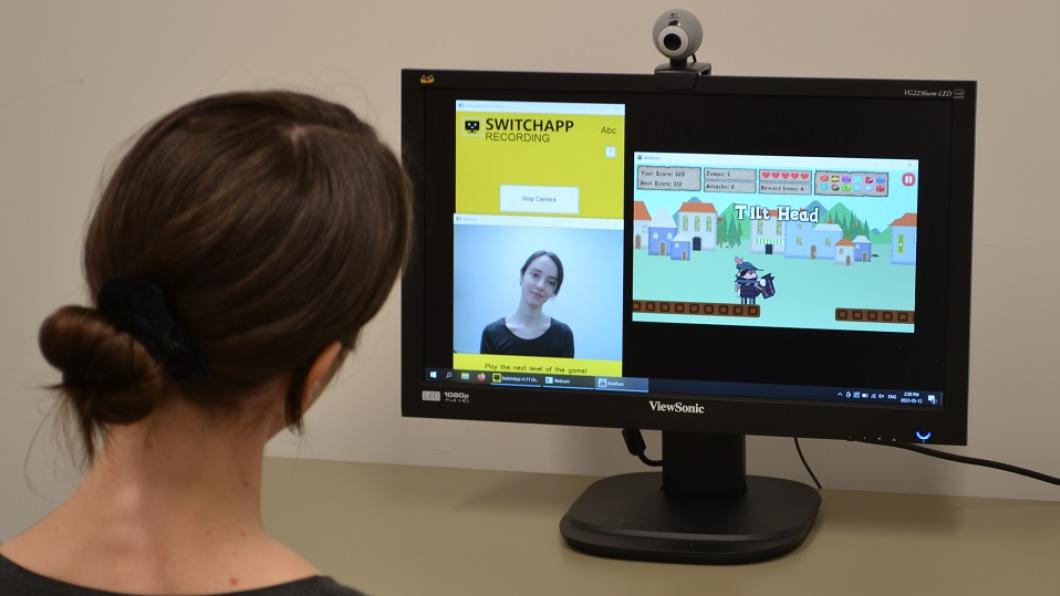
SwitchApp holds promise for people with complex needs to communicate with the world around them, boosting their digital literacy skills so they are employment ready
The recent pandemic has led to a sea change in the workplace and its irreversible reliance on digital technologies to communicate and do business. While working remotely has broken down barriers in the workplace by reducing the need for travel to workplaces for people with disabilities, the technology used in workplaces, such as conventional laptops or desktop computers with keyboards may not be accessible for individuals living with severe physical disabilities and debilitating medical conditions.
Enter SwitchApp. Developed by the PRISM Lab, this is a personalized access technology that enables individuals with severe physical disabilities and complex communication needs to use a computer through a combination of head movements, facial gestures and vocalizations.
Fanny Hotzé, a pediatric assistive technology specialist at the PRISM Lab, says SwitchApp is unique.
“To the best of our knowledge, there isn’t any similar technology currently being developed or commercially available on the market. SwitchApp is the only access technology that adapts to the user’s changing speech and quality of movement over time. We believe this will provide a sustainable long-term access solution for individuals with severe motor impairments and complex communication needs, including those with neurological injuries and progressive conditions.”
For the past five years, the team led by Hotzé, has been collaborating with families of children living with cerebral palsy and complex communication needs to develop the access technology with funding from the Cerebral Palsy Alliance Research Foundation.
And now, the program has recently been awarded a $171,912 funding boost from the federal government’s Accessible Technology Program. Holland Bloorview is one of 11 organizations to have received funding as part of the $5.8 million investment of the second phase of the federal program announced on May 4th in a media release by Innovation, Science and Economic Development Canada.
“We are very excited about this new grant from the Accessible Technology Program (ATP), which has been very generous in supporting our research at Holland Bloorview over the last 5 years,” says Tom Chau, senior scientist and head of the PRISM Lab. “This funding will allow us to expand our uniquely flexible SwitchApp technology to the workplace, where young adults with disabilities will be able to perform work-related activities using a personalized combination of vocalizations, keywords, head movements and facial gestures.”
Chau adds SwitchApp will not only lead to increased independence but will also enable people with disabilities to engage competitively in the digital economy, by facilitating access to digital tools and supporting the acquisition of basic and advanced digital literacy skills (i.e. – coding, cyber security, digital design).
As part of the ATP grant, the research team will be making SwitchApp more broadly available by implementing it on iOS and Android platforms. Currently, it is only available on Windows.
The technology is still in its research phase, but the PRISM Lab team is actively collaborating with clients, clinicians and accessibility services to make this technology commercially available.
Petra Karlsson, a senior research technology program lead at the University of Sydney's Cerebral Palsy Alliance Research Institute, has been leading the clinical testing of SwitchApp with children in Australia. She was a visiting scholar at the Bloorview Research Institute in 2107 and was a co-investigator on the initial SwitchApp gran funded by the research institute's foundation.
“SwitchApp holds the potential to be a key that can unlock communication potential in people living with severe motor disabilities and complex communication needs. I am very proud to be part of this innovative project.”
In addition to this recent funding from the ATP, the PRISM Lab has received nearly $700,000 previously from the federal program to support their innovative research on the Hummingbird and pediatric brain computer interfaces, two other assistive technologies that enable children and youth with physical disabilities to communicate with the world around them.
Learn more about the PRISM Lab’s research.